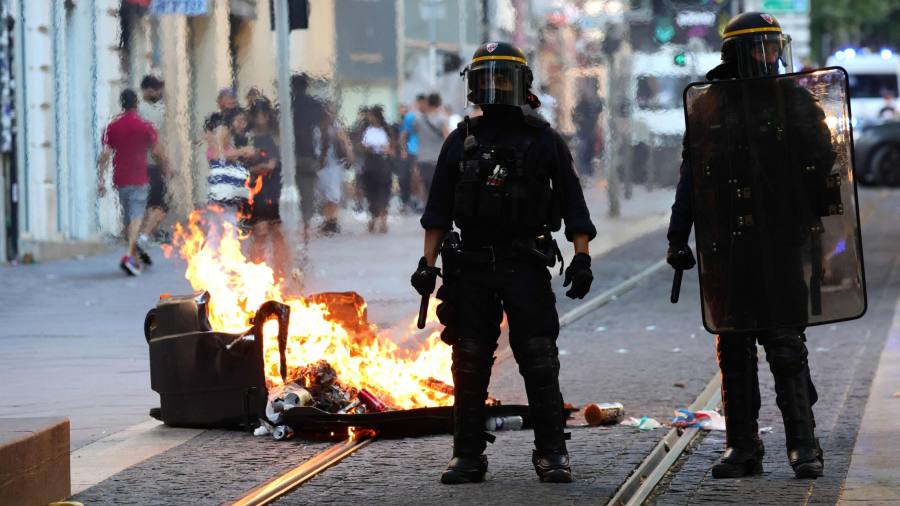
Receive free French politics updates
We’ll send you a myFT Daily Digest email rounding up the latest French politics news every morning.
The writer is senior fellow at the German Council on Foreign Relations and a former adviser to Emmanuel Macron
In July 2017, the freshly-elected Emmanuel Macron picked a fight with the head of the armed forces after he questioned the French president’s commitment to defence spending. Macron recalled that in a republic, the military follows orders from the executive and not the other way around. This bold dismissal asserted his authority and reminded everyone of the principles of a well-functioning democracy.
Today, Macron needs to do the same with France’s runaway police force. After decades of the worst possible combination of neglect, empowerment and lack of accountability, they have become a hotbed of racism and brutality. A week of riots following the fatal police shooting of 17-year-old Nahel Merzouk reveals the threat this can pose to social cohesion.
Since 2001, France has passed a new security law arming police nearly every year. But none seem to have made policing more effective. In 2005, after two teenagers died following a police chase, new crowd control techniques and expansive use of intermediate weapons were deployed in the banlieues despite being banned in most of Europe.
Their widespread use during the gilets jaunes movement of 2018-2020 led to hundreds of reported cases of police abuses (and eventual restrictions to the constitutional freedoms of assembly and demonstration). Perhaps even more concerning is the impunity. Hundreds of disproportionate use of force cases were referred to the Inspection Générale de la Police nationale (24 reported people losing an eye) but criminal charges and sanctions were minimal.
This is no surprise. France’s watchdog stands out among other European independent police complaints authorities for its lack of independence and funding. Meanwhile, fear of public disorder and the reality of terrorist threats have pressured successive governments to expand the police arsenal, increase the number of officers and weaken their accountability. The French police kill four to five times as many people today as in 2010. This is made worse by a criminal justice system that casts abuses and racism as isolated cases, even though the French ombudsman and administrative courts have long recognised their systemic nature.
The situation is compounded by the police trade unions. Alliance and UNSA make up over half of unionised police officers and their incendiary communiqué last week referred openly to a “state of war”, to the need to eliminate “rodents” and “savage hordes”, a vocabulary connected to France’s darkest moments. This is preoccupying in a country flirting with a victory for the Rassemblement National in 2027, given that Macron will not be able stand again mainstream parties have recently been pulverised and issues of identity are very much to the fore.
Action must be taken on several fronts. Longstanding neglect of conditions in the banlieues on crime, employment, education and race must not be dismissed. In 2018, Macron was presented with a bold plan to invest massively and advance economic opportunities there. It was binned on the day of its official presentation, and the Presidential Council for Cities quickly unravelled. This needs urgent revisiting.
In addition, the unacceptable violence, chaos and looting cannot be dismissed without hearing the social angst. Profound reform of the police is needed, as is forceful engagement with racial discrimination and abuses. Establishing a truly independent inspection agency would be a good place to start. But the doctrines behind maintaining public order must also change to favour de-escalation.
Finally, though it rubs against the myth of a colour-blind republic, one must recognise that a large segment of France’s population currently feel its celebrated promise is not for them. It is this that explains their seemingly absurd desire to strike at its very institutions.